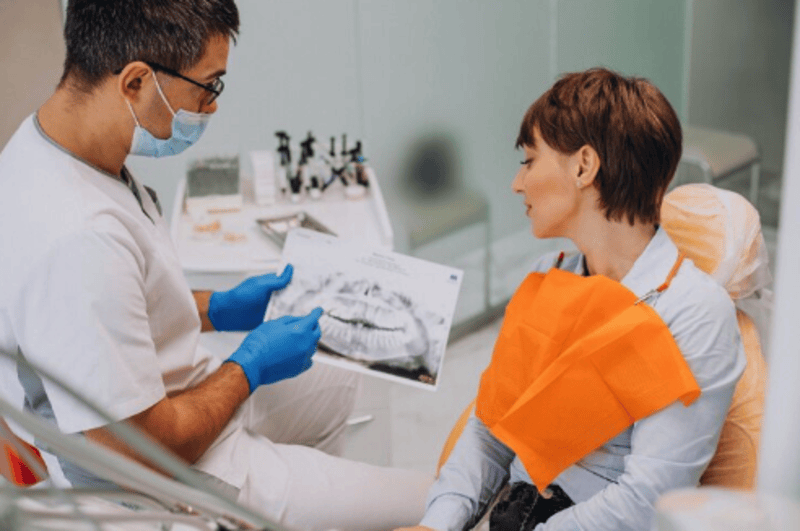5 Signs You May Need Dentures And How To Get Started

Think about being around people you care about and being smitten by self-doubt whenever you try eating. You have begun to avoid some foods and the ones you love the most because masticating has become a challenging task. Getting dentures might be your way out if you know these feelings.
Dentures not only help to fix your smile but can also improve your general well-being. In this article, we’d like to explore the signs that suggest a patient may have to wear dentures. We’ll also counsel you on how to use the dental treatment that will dramatically change your life.
Signs You May Need Dentures

1. Loose or Shifting Teeth
Loose teeth conventionally point to severe conditions such as periodontal disease or bone loss. More than 40% of individuals over 30 are at risk. It is not only an appearance-related problem but also a health-related problem. Loose teeth may cause periodontal disease and oral infections.
The infection may also spread to the mouth’s gums, bonds, and tissues. In addition to the tooth's instability, the rest of the teeth may dislodge, resulting in problems chewing and speaking. The CDC states that 47.2% of individuals aged above 30 are at risk of periodontal disease.
Discomfort during eating can lead to nutritional deficiencies, as people avoid crunchy vegetables and fibrous fruits. In case of loose teeth, seeking timely professional help is necessary. Try searching for ‘dentures near me’ on search engines to locate a reputed family dentist to regain your smile and overall quality of life.
2. Difficulty Chewing or Eating
Avoiding specific foods due to poor teeth alignment may lead to dental malnutrition. A survey by the Journal of Gerodontology has shown that 30% of seniors have to change their diet due to their teeth loss, which is the reason for both overweightness and malnutrition.
These people cannot chew tough foods such as meats, whereas softer and less nutritious alternatives are chewed. This dietary shift will bring about unplanned weight changes and increased health risks.
In other words, restoring natural chewing ability is critical to overall health. Whether lost, worn, or decayed, dentures can restore chewing ability and allow people to enjoy various nutritious meals.
3. Pain or Discomfort
Missing or damaged teeth can cause chronic pain that can interfere with daily activities and diminish quality of life. The condition could reveal itself so that one experiences discomfort when having hot or cold food and persistent pain that hampers their capacity to sleep.
It was found through recent research that almost 20% of adults are having a difficult time because of dental pain that bothers their daily activities. For instance, somebody might have piercing pain when taking cold drinks caused by the exposed nerves from broken teeth.
Eating this way can be painful, and one can even get embarrassed about it, mainly if such gatherings of friends include food. The sooner you address these issues, the better; this will help prevent other problems from developing and improve your quality of life.
4. Self-Consciousness or Embarrassment

The psychological burden of having missing teeth usually brings about the feeling of self-consciousness and embarrassment. Studies have shown that the loss of teeth can lower self-esteem and contribute to physical incapacity in those affected.
Many individuals who do not want to show their poor oral health to others avoid places where others gather.
Such evasive behavior can cause social phobia and depression to intervene in the process. Dentures can revolutionize the unpredictability of living without them. Not only because they restore function but also because of the confidence they bring out in the smile.
5. Gum Disease or Infections
Missing teeth leads to gum disease and infection. The relationship between oral health and the overall health of the human body is robust; if someone does not take care of their gum problems.
They might end up with more severe complications, such as cardiac disease. A recent study found that people with periodontal diseases die younger, demonstrating the importance of maintaining healthy oral hygiene.
This swelling may worsen with time, particularly if not treated correctly. Resolving the issues related to tooth loss rather than considering dentures is a must; thus, letting the mouth be healthy is the casting block for your new smile.
Getting Started with Dentures

The denture process itself begins with a dental consultation. Your initial appointment will consist of a review of your oral health and a recommendation of treatment options. Your dentist will fully explain the details of denture choices and the system.
Creating the dentures according to the custom fit starts with dental impressions, ensuring comfort and wellness. The right wearing and care are very important for implant and gum health. Your dentist will give you denture care instructions.
It is expected to get used to the dentures after the first fitting. To fix the problem, periodic returns are necessary. Regular examinations of your denture ensure the right shape and function, while the rest of the mouth is taken care of through regular dental care.
Conclusion
Dentures can provide more than one option for these issues. By going to the dentist and following the necessary steps, you can be sure that you will receive the best of care and that you will be able to show off your healthy and happy smile instead of shouting. Don't wait; go to a professional dentist and be confident as you move towards a better and brighter tomorrow. That said, White Hill Dental in Levittown, PA offers prompt and professional dentures services to address urgent oral health needs.
Similar Articles
Temporomandibular Joint Disorder, commonly known as TMJ, is a condition that causes pain and dysfunction in the jaw joint and surrounding muscles. This disorder can arise from various factors, including teeth grinding, arthritis, jaw injuries, poor posture, or stress.
A root canal is a common treatment that people pay the dentist a visit for. According to a study, root canal treatment claims were up by 42% in the last five years.
Family dentistry isn’t just about teeth—it’s about bringing convenience, care, and a few laughs to your household’s dental game. Think of a family dentist as the Swiss Army knife of oral healthcare, equipped to handle everything from baby teeth to grandma’s bridgework.
Early identification of dental decay is critical. It can aid your dentist in reversing the problem by administering proper therapy. However, the early stages of tooth decay are almost impossible to detect with the human eye.
Cosmetic dentistry is a branch of dental practice that focuses on improving the appearance of teeth, smiles, and overall oral health. This field of dentistry has grown significantly over the past few decades and offers patients a wide variety of procedures to address a wide variety of cosmetic issues.
Ah, the bittersweet moment when a tooth has overstayed its welcome. It’s been with you through thick and thin—chewing your favorite snacks, smiling in photos, and grinding during those stressful nights. But now, it’s time to part ways
Boost patient trust and diagnostic accuracy with high-quality intraoral cameras. Enhance care, improve communication, and streamline operations in your dental practice!
Imagine this: You just walked out of the dentist's office after your laser gum contouring procedure, and your smile is on the verge of greatness: no more gummy grins or uneven gum lines. You’re practically ready to hit the red carpet. But hold up — what happens next? How fast can you expect to heal after your gums get their laser makeover?
Have you ever wondered how orthodontic treatment has evolved over the years? Are you curious about the latest innovations in teeth straightening technology? Have you heard about Invisalign but aren't quite sure how it works or if it's right for you? If you've found yourself pondering these questions, you're not alone.









